Free Tennessee Last Will and Testament Form
A Tennessee last will and testament is a document that contains the final will of its owner (testator) and decides precisely how and by whom their estate will be used in case of death. As a preventative measure, it is highly recommended to come up with a last will.
A properly created last will can be essential to your loved ones and relatives upon your passing even if you don’t possess lots of property and assets.
Here, you can find a Tennessee last will and testament form for download and the information that will settle your slightest doubts in relation to estate planning, types of last will, and ways to make a sound document.
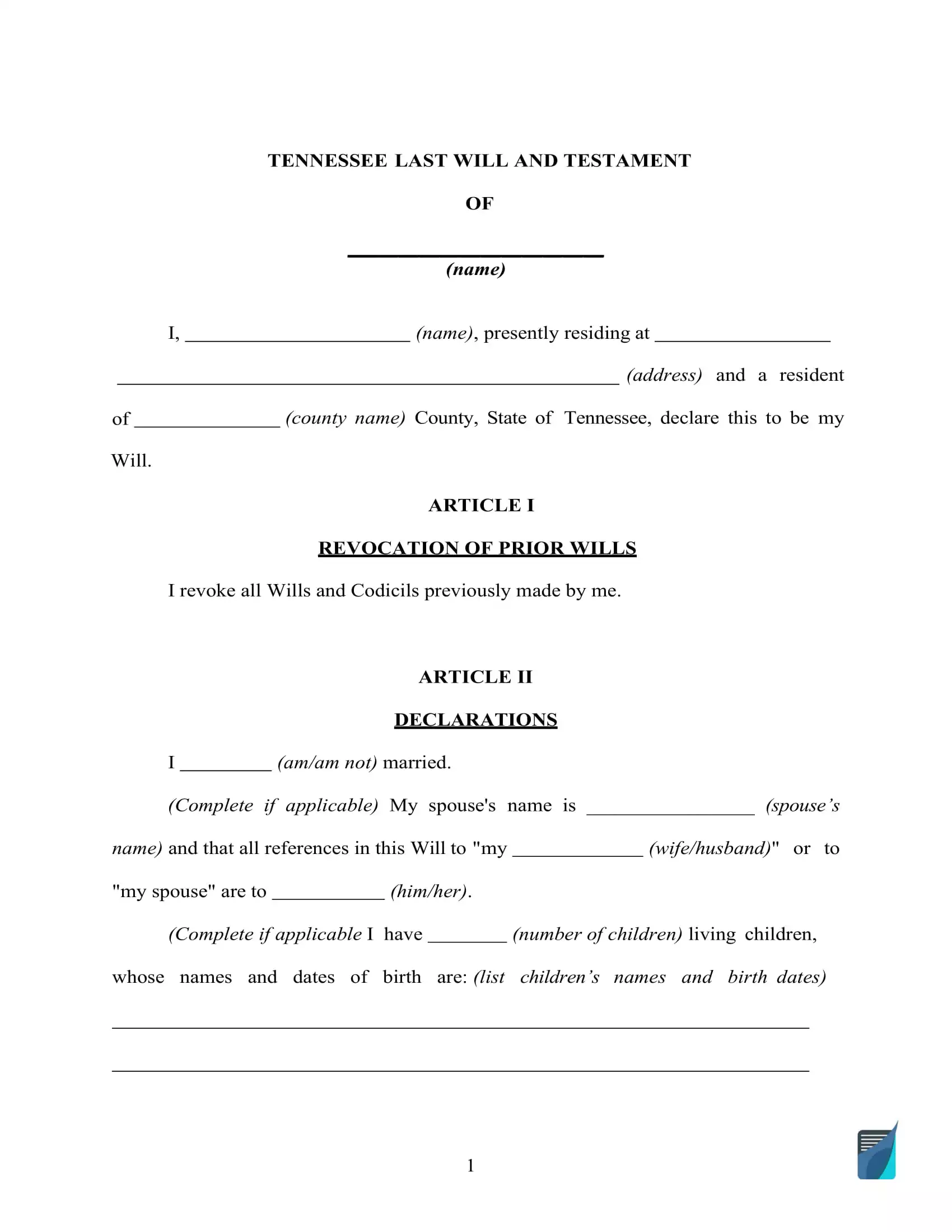
Build Your Document
Answer a few simple questions to make your document in minutes
Save and Print
Save progress and finish on any device, download and print anytime
Sign and Use
Your valid, lawyer-approved document is ready
Tennessee Last Will Laws and Requirements
| Requirements | State laws | |
| Statutes | Title 32 – Wills | |
| Signing requirement | Two witnesses | 32-1-104. Will other than holographic or nuncupative — Signatures |
| Age of testator | 18 or older | 32-1-102. Persons qualified to make a will |
| Age of witnesses | 18 or older | 32-1-103. Witnesses — Who may act |
| Self-proving wills | Allowed | 32-2-110. Affidavit of witnesses to prove will |
| Handwritten wills | Recognized if meeting certain conditions | 32-1-104. Will other than holographic or nuncupative — Signatures |
| Oral wills | Recognized if meeting certain conditions | 32-1-106. Nuncupative will. |
| Holographic wills | Recognized if meeting certain conditions | 32-1-105. Holographic will |
| Depositing a will | Possible with a Tennessee county chancery court A fee is $5 | 32-1-112. Deposit of will with probate court |
How to Write a Tennessee Last Will
1. Consider your options. Before starting, you should determine if you’d like to use the assistance of an attorney or write the whole document on your own. In the event that you want to prepare the last will on your own, pick the type you’ll use: a handwritten (holographic) will or maybe a free last will and testament form.
2. Indicate your information. Fill out your full legal name and address (the city, county, and state of residence) to determine the testator of the will. Reread the remaining portion of the section, including the information you’ve entered and the “Expenses and Taxes” subsection.
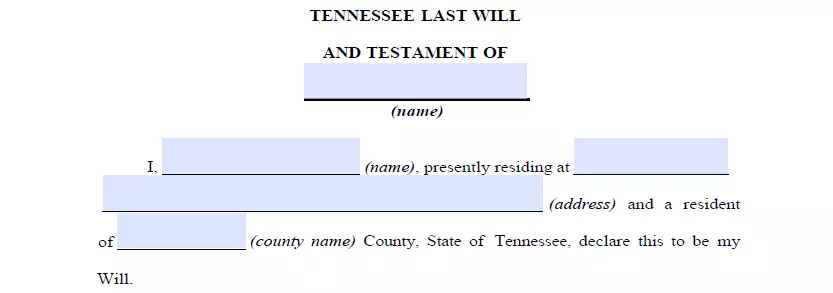
3. Establish the executor. Determine the executor of your property and specify their specifics: full name and place of residence, which will ordinarily be in the same state the testator lives since nearly all states impose special rules on out-of-state executors. Although it is not mandatory, it might be wise to appoint one more person to be an executor if the first one is unwilling or incapable of carrying out your last will.
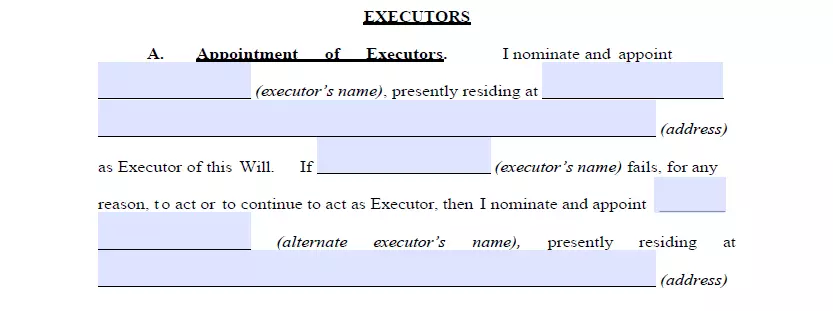
4. Determine the guardian (optional). In case you’ve got underage or dependent children and don’t want the court to choose a guardian for the kids when you’re no longer here, it is possible to appoint somebody you know as a guardian for your children.
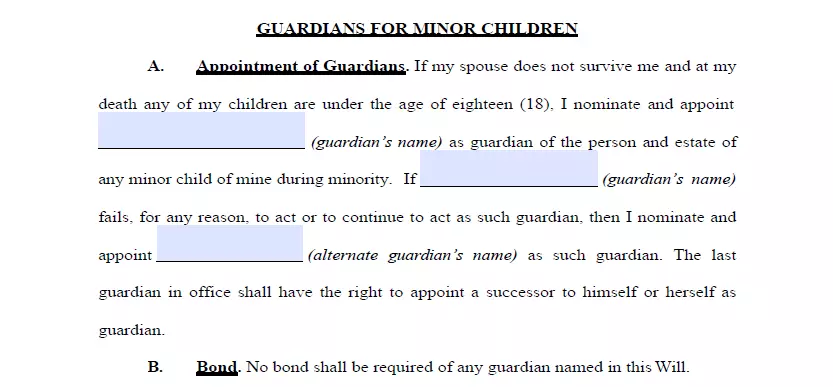
5. Establish your beneficiaries. Now indicate people to whom you’d like to bequeath your assets, that is, your beneficiaries. For every beneficiary, indicate these details: full legal name, address, and the way they are related to you.
6. Designate possessions. It’s possible to specify which of your respective beneficiaries receives this or that piece of property. Otherwise, the assets will be distributed evenly amongst the listed beneficiaries. Assets can include cash, shares, real estate, company ownership, money for arrearage, and any tangible things of monetary value that count among your possessions. Yet, joint and living will assets, along with your life insurance, cannot be put into your will.
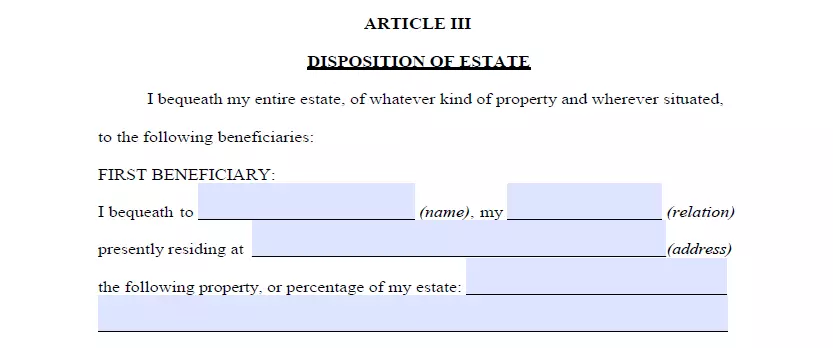
7. Ask witnesses to sign the document. According to Tennessee Annotated Code, for any last will to be legally correct, it has to be signed by two witnesses. They should be over 18 years old and have no interest in your property, meaning these people can’t be beneficiaries. Consider choosing witnesses who are younger than you to make sure that they will likely be present if the will is contested in the court or if some other issue occurs.After a complete revision of every passage in your will, all parties involved (you and the two witnesses) will have to fill out their names and full addresses and sign the document.
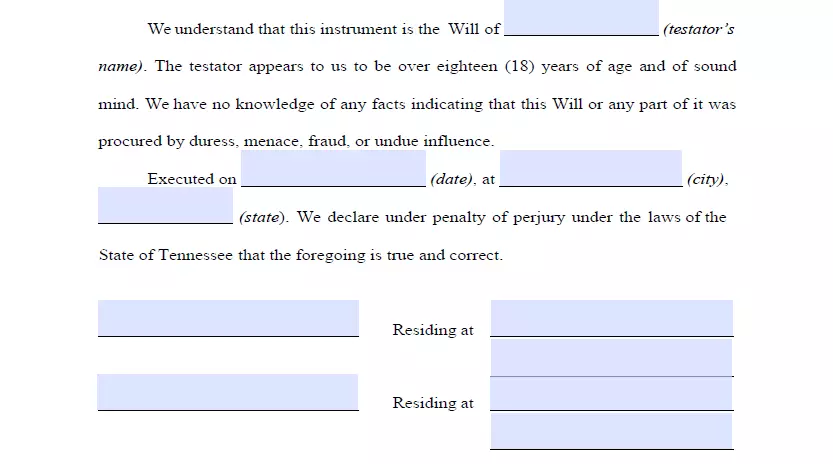
Get a Free Tennessee Last Will Template
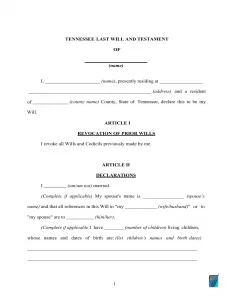

Frequently Asked Questions
Is last will notarization required by Tennessee statute?
A will in Tennessee is effective without notarization. However, in case you intend to add a self-proving affidavit to the last will and testament, you’ll have to attest it. Making your last will self-proving is actually a great idea because it quickens the probate and provides another level of security if the will’s credibility is contested.
What does it imply to be testamentary capable?
In order to make your will and modify it (to be testamentary capable), you have to fulfill certain requirements. There are usually two requirements to meet: age and soundness of mind. In most states, you’ve got to be over 18 years old to be able to make a last will. Soundness of mind ensures that you’re mindful of your property and the beneficiaries of your belongings and understand the aftereffects of your actions fully.
Can you exclude your children or spouse from a last will and testament?
In Tennessee, there’s no such term as community or marital property. That suggests that all possessions gained or increased while in the marriage do not have to be evenly shared between the two spouses. Tennessee law permits you to entirely exclude your marriage partner from your last will, but your spouse will have the right to elect an amount from your estate (according to §31-4-101 of the Tennessee Code).
For everyone else, it is legal in Tennessee to disinherit family members in the will. Your adult children or any other family members can be legally disinherited completely in your last will and testament. To do that, include corresponding sections to your document.
How can a physically impaired person sign their will?
Based on Tennessee Estate Code (§32-1-104), it’ll be possible for an individual to sign their last will and testament given that it’s your (as a testator) instruction and with you present.
It is possible to give specific instructions via voice communication, a positive answer to an inquiry, or gesticulation. It is possible to have a notary sign the name of a testator who is physically incapable of doing it if the latter directs the notary in the presence of a witness. Such a witness is chosen the same way one would select a trustee – they must not have any legal or equitable interest in any property being the concern of or influenced by the last will.
| Related documents | When to make it |
| Codicil | There are several small adjustments you’d like to make to your will. |
| Self-proving affidavit | You need to facilitate the probate in the future. |
| Living will | You want to be sure that, in case you become incapacitated, you get treated exactly how you’d wish to. |
| Living trust | You want to think about an alternative to a will. |
